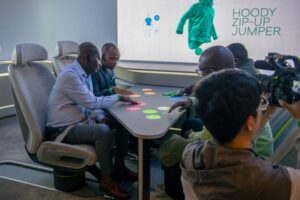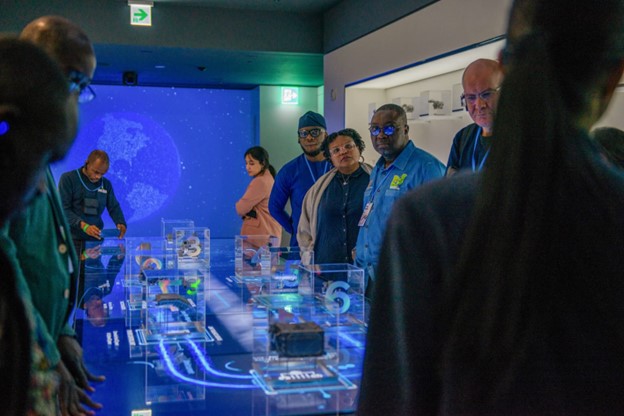- pledges tailored assistance for Africa
- Korea-Africa Summit to deepen ties, expand collaboration
By William Selassy ADJADOGO
Ghana and other countries in Africa can benefit greatly from the experience and expertise of South Korea in transforming their economies, Chung Byung-won, Korea’s Deputy Minister for Political Affairs of the Ministry of Foreign Affairs, has said.
In a recent meeting with media practitioners from across the continent, he highlighted that Korea’s evolution from a perennial aid recipient to a donor nation offers invaluable lessons that could be replicated across Africa, taking into account specific contextual nuances.
“The ROK’s transition from being an aid recipient to a donor country provides valuable insights into development processes. Korea’s history offers guidance and support based on its own developmental experiences, which could particularly benefit African countries striving for self-reliant development,” the Deputy Minister stated.
At the meeting, the Minister highlighted several key initiatives and plans that South Korea is implementing and intends to expand to further enhance economic development in Africa.
Financial Support and Official Development Assistance (ODA)
South Korea, he stated, has pledged to significantly increase its Official Development Assistance (ODA) to Africa by 2030. This commitment includes doubling its financial support to African nations, reflecting a long-term commitment to fostering sustainable growth and development.
In September last year, the Korean government announced a substantial financial package of US$6 billion to fund various projects in Africa. This financial injection is part of Korea’s proactive approach to collaboration with African countries, aiming to address critical infrastructure needs, promote economic diversification, and support social development initiatives.
Quality and Tailored Assistance
One of South Korea’s strengths, he noted, lies in providing tailored assistance that addresses the specific needs and conditions of each African nation. This approach ensures that the assistance provided is relevant, and effective, and contributes meaningfully to the recipient country’s development goals.
The Knowledge Sharing Program (KSP) is a prime example of this demand-driven assistance model. Under the KSP, projects are initiated based on partner countries’ needs. Since its inception in 2004, the KSP has executed 82 consultation projects in 16 African countries, covering a wide range of sectors such as education, healthcare, infrastructure, and technology transfer.
Education and Human Resource Development
Education and human resource development are key pillars of South Korea’s strategy for Africa. Recognizing the importance of equipping the workforce with relevant skills, South Korea has initiated various projects in collaboration with African countries.
One notable initiative is the establishment of the LG-KOICA Technical and Vocational Education and Training (TVET) College in Ethiopia. This collaborative effort between the Korea International Cooperation Agency (KOICA) and LG Electronics aims to provide young Ethiopians with industry-relevant skills in the digital sector, preparing them for employment opportunities and entrepreneurship.
In addition to TVET programs, South Korea welcomes students from African countries through the Ministry of Education’s Global Korea Scholarship (GKS). This scholarship program provides opportunities for African students to pursue higher education in Korea, both at the undergraduate and graduate levels.
“I would like to highlight the fact that education and vocational training were essential
elements in Korea’s transformation into an advanced nation. With a large youth population in African countries, there is significant potential for synergy in human resource development, and Korea’s education system and vocational training expertise can contribute to Africa’s capacity-building and skill development initiatives,” he explained.
As of 2022, 549 African students were studying in Korea under various scholarship programs, with 82 beneficiaries under the GKS program. This initiative not only enhances educational exchange but also fosters a deeper understanding and collaboration between African and Korean academic institutions.

Technology transfer and innovation
South Korea’s advanced technological capabilities offer opportunities for technology transfer and innovation collaboration with African countries, the Minister further stated. Through partnerships and knowledge-sharing initiatives, Korea aims to support Africa in harnessing technology for economic growth and social development.
The Korea-Africa Tech Innovation Summit, held annually, serves as a platform for dialogue, networking, and collaboration between Korean tech companies and African innovators. This summit facilitates the exchange of ideas, promotes investment in technology ventures, and fosters collaboration in areas such as renewable energy, healthcare technology, and digital infrastructure.
Healthcare and pandemic response
The COVID-19 pandemic highlighted the importance of strong healthcare systems and global cooperation in addressing health crises. South Korea has been actively involved in supporting Africa’s pandemic response efforts through various initiatives.
Korea has provided medical supplies, equipment, and technical assistance to African countries to strengthen their healthcare infrastructure and capacity. This includes training healthcare professionals, establishing diagnostic facilities, and promoting public health awareness campaigns.
In addition to immediate pandemic response measures, South Korea is also collaborating with African nations on long-term healthcare initiatives, such as capacity-building in healthcare management, disease prevention, and research partnerships.
Trade and Economic Partnership
Enhancing trade and economic partnerships between Korea and Africa is a priority for both regions. Korea has been actively promoting trade and investment opportunities through platforms such as the Korea-Africa Economic Cooperation (KOAFEC) Ministerial Conference.
At the 7th KOAFEC Ministerial Conference, held last year, Korea announced plans to expand trade and investment ties with Africa. This includes increasing bilateral trade volumes, promoting investment in key sectors such as manufacturing, infrastructure, and agriculture, and facilitating business partnerships between Korean and African enterprises.
Environmental Sustainability and Green Initiatives
Addressing environmental challenges and promoting sustainable development is integral to South Korea’s partnership with Africa. Korea has been actively involved in supporting green initiatives, renewable energy projects, and environmental conservation efforts across the continent.
Through partnerships with African governments, international organizations, and non-governmental organizations (NGOs), Korea is contributing to initiatives aimed at combating climate change, promoting clean energy solutions, and preserving biodiversity.
K-Ricebelt project boosts domestic food security
South Korea launched the “K-rice belt” initiative with eight African nations to ensure sustainable food security.
As part of Seoul’s official development assistance, the project aims to provide high-yield rice varieties, agricultural machinery and necessary facilities for Africa which involves sharing expertise and technologies in crop cultivation and distribution,
South Korea signed a memorandum of understanding with eight African nations including Senegal, Gambia, Guinea, Ghana, Cameroon, Uganda, Kenya and Guinea-Bissau to implement the initiative, according to the Ministry of Agriculture, Food and Rural Affairs.
The initiative aims to produce 2,000 tons of rice in Africa this year, increasing it to over 10,000 tons annually by 2027, which would provide enough food for approximately 30 million people in underdeveloped nations each year.
This project signifies a new sphere in agricultural development, providing an additional window amid escalating global food security.
The K-Ricebelt project offers a sustainable solution by empowering domestic farmers with resilient rice varieties specifically developed for local conditions.
The project goes beyond simply providing seeds. KOPIA has established a 60-hectare rice cultivation centre in Ghana, acting as a vital hub for seed production and knowledge transfer.
Here, local agricultural experts collaborate with their Korean counterparts to develop rice varieties like ‘Korea-Mo’ and ‘Agyapa,’ boasting yields two to three times higher than traditional varieties.
Additionally, the project incorporates an indigenous rice variety, ‘Agra,’ ensuring the seeds are well-adapted to our climate and soil composition.
Impact
The success of the pilot project in 2023 speaks volumes. Ghana, along with five other African countries, surpassed the initial target, producing a total of 2,321 tonnes of rice seeds. This achievement paves the way for a more ambitious goal – reaching an annual production of 10,000 tonnes of rice seeds by 2027.
The project further equips local farmers with the knowledge and tools needed to cultivate these high-yielding varieties. This not only bolsters food security but also injects financial stability into rural communities. Imagine the impact – from relying on unpredictable imports to becoming self-sufficient rice producers, capable of feeding not just their families but the entire nation.
The K-Ricebelt project is evidence of the power of international collaboration. South Korea’s investment of over US$77 million over the next four years demonstrates its commitment to tackling food security in Africa not just through finance but also through a knowledge-sharing partnership that builds capacity within Ghana’s agricultural sector.
The project is not without its challenges, one stakeholder said. Long-term sustainability hinges on factors like infrastructure development, consistent water access, and ongoing training for farmers. However, the initial success and Ghana’s commitment to the project offer a hopeful outlook.
The arrival of these Korean seeds signifies more than just a shipment; it symbolises the potential for a food-secure future in the country. With continued collaboration and dedication, the K-Ricebelt project can be a game-changer, transforming Ghana’s agricultural landscape and ensuring a brighter future for our nation, the stakeholder added
Future outlook and collaboration
Looking ahead, South Korea remains committed to deepening its collaboration with Africa across multiple sectors. This includes expanding financial support, increasing educational exchanges, fostering technological innovation, strengthening healthcare systems, promoting sustainable development practices, and enhancing trade and economic partnerships.
The upcoming Korea-Africa Summit, scheduled for next month, will provide a platform for dialogue, cooperation, and strategic planning between Korean and African leaders. It will serve as an opportunity to further solidify the partnership and explore new avenues for mutually beneficial collaboration.










